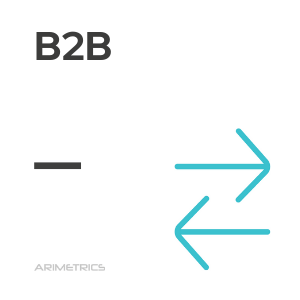
Definition:
B2B is short for business-to-business and refers to the exchange of services, information and/or products from one company to another. It thus differs from the concept of ‘business-to-consumer’, which is represented by the abbreviation B2C.
B2B is a business model in which transactions of products or services occur from the company that produces them to another.
It can include outsourcing, which occurs when a business hires a contractor with knowledge and experience in that business’s industry. The term B2B, however, is best known in the logistics realm, where wholesalers sell products to retailers, or a commercial original equipment manufacturer sells its products to wholesalers.
Differences between B2B and B2C
The main difference between directing sales to a particular customer or to a company is that the first is reached through the desire for a certain product or service and a business, through what you need. Therefore, the first must be offered an emotional stimulus that does not work with a company, in which decision-making is usually done at several levels and where it is more interesting to be guaranteed success than satisfaction.
There are other differences between B2B and B2C, which influence the marketing strategies to be used and the business forecasts:
Business-to-business is focused on making large sales, while B2B is mainly oriented to small sales.
B2B tries to cover specific needs; the sale to private customers, basic needs.
In the first case, medium-long term goals are pursued, while in the second case, immediate results are expected.
How B2B marketing works
Marketing that focuses on other companies and not on the customer must have special characteristics for one main reason: the market niche is smaller and it is more complicated, therefore, to reach the interlocutor.
At first it was called B2B industrial marketing, since it only dealt with the sale of raw materials and components necessary to manufacture other products. However, that approach has changed today, in which transactions between companies are much more complex.
Recommendations for B2B businesses
Taking into account that, as we have mentioned, in the B2B purchase the practical component surpasses the emotional one, to succeed certain recommendations must be taken into account:
- Maximize Internet presence. The exponential increase in e-commerce sales also affects B2B businesses. Therefore, it is essential to have a well-structured and designed website, in addition to offering facilities for online sales.
- Design a good online marketing strategy, which includes campaigns in Google Ads, Facebook Ads and the most appropriate platforms for each business.
- In relation to the above, have a careful and updated image on social networks. As in any search, companies also track the activities of other companies on the networks.
- Effectively manage more direct actions, such as e-mail marketing. This also allows you to create a loyalty bond with the customer.
- Offer quality content on a blog or on the website itself. It can include usage tips, webinars, etc.
Examples of B2B business
The B2B business model can include both suppliers of a company and, in the case of an e-commerce, a marketplace that sells products from different companies.
Some clear examples are:
- Companies that offer payment methods (credit cards, contactless systems).
- Packaging and logistics providers.
- Sellers of computer products (such as Adobe and Apple).
- Distributors of vehicles and industrial machinery.
